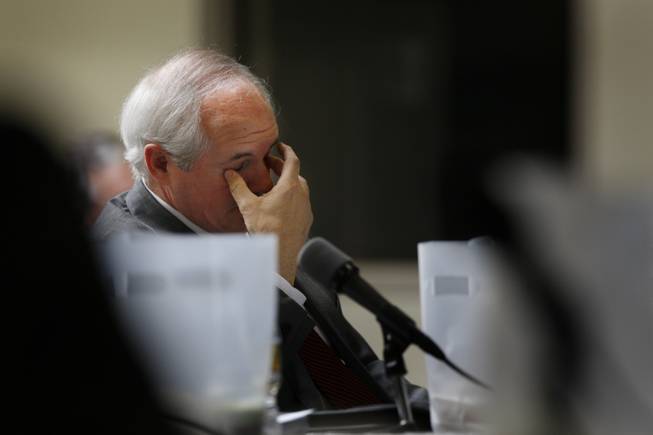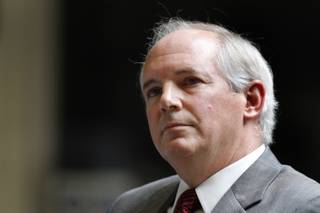
UNLV President David Ashley rubs his eyes during a regents meeting at the Desert Research Institute Friday, July 10, 2009. The regents of the Nevada System of Higher Education decided to demote Ashley from his position as president and return him to the university faculty.
Saturday, July 11, 2009 | 2 a.m.
Sun Archives
- UNLV president demoted to university faculty spot (7-10-2009)
- UNLV president garners praise, catches a break (7-8-2009)
- Bonnie Ashley will not be part of the regents’ discussion (7-8-2009)
- Ashley says he's ready to respond to state's concerns (6-27-2009)
- Regents to discuss future of UNLV president at July meeting (6-22-2009)
- Rogers calls for Ashley’s ouster (6-17-2009)
- Rogers: UNLV President Ashley should be fired (6-16-09)
- Decision on Ashley wanted soon (6-9-2009)
Sun Coverage
Beyond the Sun
David Ashley knew going into Friday’s face-off with regents that he would have to defend his communication skills, his level of involvement in the community and possibly even how he handled his headstrong wife.
He didn’t think he’d have to defend standing up for his university during the recent legislative session.
But that was the clincher complaint that appeared to seal Ashley’s demotion from the UNLV presidency. After a daylong hearing on Ashley’s performance, instead of extending his contract, the Board of Regents unanimously reassigned Ashley to the faculty with a new office and a year of his presidential salary.
Many issues raised by the regents were expected: Ashley’s a poor communicator; he has a reputation for not responding to people; and he occasionally ignores easily managed issues until they blow up in his face.
But a few of the dozen regents and new Chancellor Dan Klaich also were highly critical of something else: Ashley’s refusal to roll over when the board’s plan for dealing with budget cuts disproportionately hit Southern Nevada colleges.
Klaich and Regents Jason Geddes and Ray Rawson led an attack on Ashley for his lobbying of legislators on behalf of UNLV. Ashley sought to unfairly gain a benefit for his institution at the expense of others in the state’s higher education system. Ashley’s actions dealt a blow to the shaky union those institutions had formed in recent years, Rawson said.
The Board of Regents had proposed to the Legislature a budget plan that would make the same percentage cut in every institution’s budget. Under that plan, because of funding inequities that have existed for decades between Northern and Southern Nevada, UNLV would have taken a bigger hit than its Northern Nevada peer. UNLV’s budget would have lost $11 million more than that of the University of Nevada, Reno.
Geddes, who represents Washoe County on the board, said Ashley’s behind-the-scenes lobbying to make the reductions more equitable showed he can’t collaborate and wasn’t interested in the good of the system. In other words, he wasn’t a team player.
“You continued to pursue your dissenting opinion throughout the session and the final vote came out as your decision. I found that very troubling,” Geddes said. “You can dissent all you want (initially), but once the board makes a decision, you need to give it up.”
Rawson, a former state senator who represents Clark County on the Board of Regents, said the end run had cost Ashley the respect of other system presidents. He said Ashley’s behavior was destructive to higher education.
“There have been times when I’ve been as passionate about fighting for my issue as you are,” Rawson said. “But experience teaches you that we do better together ... We lost ground because of what happened in the session.”
He said it would make it more difficult to deal with the Legislature in the next session.
Klaich, also from Northern Nevada, said university presidents have no right to lobby independently.
“The budgetary decision was made,” he said, “and once this board makes a decision, all of us who are officers of the board have an obligation to support the recommendation of the board.”
At his hearing and in interviews afterward, Ashley defended his interaction with the Legislature. He said he had then-Chancellor Jim Rogers’ blessing to take his concerns about inequity to legislators.
“It was what I had to do for the university,” Ashley said after the meeting. “I absolutely felt I was within the scope of what I was allowed to do and even encouraged to do by the chancellor. I couldn’t have done anything else. It would have undermined UNLV.”
Rogers said at the meeting that he had given Ashley clearance to fight for his views among the presidents and to give a dissenting opinion to the regents when the proposal was presented to them. But he did not reveal whether he had given Ashley the green light to lobby the Legislature.
Rogers couldn’t be reached for comment after the meeting. But one of his earliest priorities had been ending the long-standing funding tug-of-war between the universities in the north and south. He pushed out Carol Harter as president of UNLV and John Lilley as president of UNR in 2006 and 2005 in part because of their inability to work well as a team.
Student representatives had a different view of Ashley’s lobbying effort. They said it was Ashley’s job to stand up for the university against unfair and crippling cuts and that they were proud of the work he did in Carson City. They said it saved jobs and helped keep the university alive.
“I say God bless him for advocating for UNLV and the funding, and I hope the next president has the temerity to do that,” UNLV student body President Adam Cronis said. “Unity is important, but when the rubber hits the road, as president you have to look at your people and their lives.”
Students, faculty and one former regent said Ashley had been unfairly singled out on the matter. They said he was one of many who fought the regents’ budget plan.
“He was part of a huge population of Southern Nevadans that were against it,” said Steve Sisolak, a former regent turned Clark County commissioner. “It was a disproportionate cut to UNLV versus UNR. It was obvious, egregious and should have been brought to the attention of the Legislature sooner.”
Graduate students said the campus community would have turned against Ashley if he had acted in any other way.
“Faculty and students would have said he failed the university if he had been silent about that plan,” said Kyle George, vice president of the Graduate and Professional Student Association. “He was damned if he did and damned if he didn’t.”


Join the Discussion:
Check this out for a full explanation of our conversion to the LiveFyre commenting system and instructions on how to sign up for an account.
Full comments policy